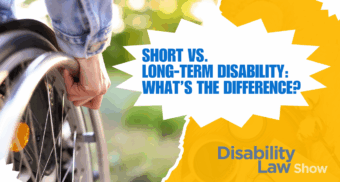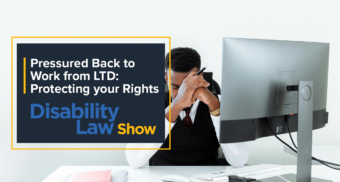Disability Law Show – Season 5 Episode 17
Episode Summary
3 FAST FACTS ABOUT CHRONIC PAIN AND LTD on Season 5 Episode 17 of the Disability Law Show with disability lawyer and co-managing Partner Sivan Tumarkin and national practice leader and disability lawyer, James Fireman.
Watch above to discover the steps you need to take when the insurance company cuts off or denies your long-term disability claim in provinces across Canada, excluding Quebec, on the only disability law show on TV and radio in the country.
Episode Notes
Denied LTD due to loss of employment
I worked as a senior engineer and had been working through cancer treatments. Unfortunately, I was eventually let go due to performance issues. I applied for LTD but was denied as I’m no longer employed.
- Loss of employment and disability benefits: Insurance companies often take the position that claimants that have lost their employment can no longer apply for or receive disability benefits. Before accepting a denial, claimants should seek legal advice from a disability lawyer that is aware of both employment and disability issues. Claimants in this situation could not only be owed disability benefits but severance pay from their former employer.
Pressured back to work from mental health claim
My depression and anxiety worsened during the pandemic. After frequent panic attacks, I stopped working and went on LTD. My insurance adjuster is pressuring me to go back when I’m not ready. What should I do?
- Returning to work from LTD: Individuals on long-term disability should return to work only with clearance from their treating doctors. Insurance adjusters can be aggressive and pressure claimants to return to work before they are ready to do so. A return to work before a claimant is medically cleared to do so, can lead to a regression in recovery.
- Communicating with an adjuster: Claimants should confirm all communications with an insurance adjuster in writing. Communication that is recorded can ensure that the full context of a claim is documented. Insurance adjusters have an obligation to behave in good faith with claimants. Adjusters that have aggravated a claimant’s health and recovery could face additional legal damages.
3 Fast facts about chronic pain and LTD
- Definition of chronic pain: Chronic pain is defined as any type of pain that persists for longer than six months and leads to an inability to work. Chronic pain often begins with an initial physical injury. Treatment and recovery are not always easy to predict. Chronic pain can also be considered a mental health issue.
- Objective medical evidence: Invisible illnesses are not seen from medical equipment or imaging. There are many illnesses, particularly psychological illnesses, that are unable to be quantified and seen. A treating doctor can provide reports for a claimant’s application for long-term disability in order to prove a claimant is unable to work.
- A common reason for a denial of benefits: A lack of objective medical evidence is often used in order to deny chronic pain claims. A lack of evidence cannot and should not be considered a reason to deny benefits. Claimants who have the support of their treating doctors should receive LTD benefits.
A COVID-19 long-hauler applying for LTD
After contracting COVID my brother has experienced long-covid symptoms. His treatment provider has said many people with long-haul symptoms have been denied LTD and now he’s worried about applying.
- COVID-19 long-hauler applications: Many individuals continue to experience symptoms of COVID-19 long after recovering from the virus. Claimants should not hesitate to apply for long-term disability if they have the support of a treating doctor. The COVID-19 long-haul diagnosis is still considered a somewhat novel diagnosis however, ultimately a diagnosis is not necessary.
PREVIOUS EPISODE: Disability Law Show S5 E16 – What to know about medical files while on LTD




